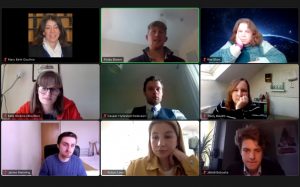There’s no doubt that the past year has presented a huge challenge to public engagement with research, but it’s one to which the BU research community has risen brilliantly.
With an increased national awareness of the role HEIs play in research, and vice versa, comes a stronger imperative to engage public audiences in the exciting research carried out at BU. In a series of posts this week we’ll be taking a refreshed look at public engagement with research in the context of the past year, some inspirational examples of projects by BU academics and advice on how to develop public engagement work.
Engaging online
The start of restrictions on events last year saw a mass pivot to online engagement with research, adapting familiar formats for online delivery and developing new techniques too.
We’ll take a closer look at some of these examples in future posts, but here’s just a flavour of the activities carried out over the past year to engage the public in research;
- Café Scientifique has been held online since September last year, drawing in record numbers from around the globe. Find out more about how we’ve delivered these events online and an academic’s experience of being involved.
- Dr Oliver Gingrich; researcher, creative practitioner, and artist with the collective Analema Group, held an online research film premiere and Q&A on urban noise and wellbeing. Oliver’s experiences and advice are covered in more detail in another post.
- The ESRC Festival of Social Science 2020 was held almost entirely online across the national festival. BU held five live online events, as well as an online exhibition, covering topics as diverse as online gambling, communicating public health data, visual perception, social care decisions, Dorset heritage and nature, and female political leadership. Take a closer look at these events in another post.
- Dr Catalin Brylla screened his film on blindness, wellbeing and stigma in the virtual world of Second Life, where his public group have their own ‘island’.
- The Ageing and Dementia Research Centre hosted informal coffee mornings to chat about their research and empower relevant audiences to feed back on ongoing and future research.
- Dr Sarah Collard shared interviews, personal experience and hosted discussion on the topic of exercising with epilepsy.
- The Department of Life and Environmental Sciences (LES) translated their fledgling Family Science Festival to an online format, and were invited by leading environmental science funder NERC to share their experience.
- The SURE 2021 conference highlighted excellent research from over 100 undergraduates in a full day conference for audiences inside and outside of BU.
The future of online engagement
It has been really impressive to see how academics have adapted and reformulated their plans for public engagement with research. We’ve seen people use this situation as an opportunity to refresh their thinking and explore the opportunities presented by online engagement, rather than be limited by it. There are a number of advantages that mean it should remain an option to consider;
- Online engagement with research is more accessible for many people and can reach entirely new audiences as a result
- It is often cheaper, avoiding venue, travel and catering costs
- Being open to attendees at a national or international level means your audience can be very specific, but much larger than a local event. In the right context, this can be an effective pathway to achieving research impact.
However, we can’t just move everything online and call it a success. There are potential downsides to engaging online that can vary depending on your context;
- Increased accessibility for some means decreased accessibility for others; limited IT skills, confidence and equipment exclude many from joining
- It is more difficult to foster a sense of interpersonal connection when engaging online, compared to in-person experiences
Looking ahead, we need to find a balanced approach, in which online engagement is just one highly effective option among many others that might work for engaging the public with research. Later this week we’ll look at what support is available at BU for developing strategies and activities to engage the public in research.





 Thursday 22 April at 4pm
Thursday 22 April at 4pm Wednesday April 21st 16:00 – 17:00
Wednesday April 21st 16:00 – 17:00  Tuesday 13th April – Thursday 15th April 2021
Tuesday 13th April – Thursday 15th April 2021












 New weight change BU paper
New weight change BU paper One week to go! | The 16th Annual Postgraduate Research Conference
One week to go! | The 16th Annual Postgraduate Research Conference Geography and Environmental Studies academics – would you like to get more involved in preparing our next REF submission?
Geography and Environmental Studies academics – would you like to get more involved in preparing our next REF submission? Congratulations to three former BU staff
Congratulations to three former BU staff MSCA Staff Exchanges 2024 Call – internal deadline
MSCA Staff Exchanges 2024 Call – internal deadline Applications are now open for 2025 ESRC Postdoctoral Fellowships!
Applications are now open for 2025 ESRC Postdoctoral Fellowships! Horizon Europe – ERC CoG and MSCA SE webinars
Horizon Europe – ERC CoG and MSCA SE webinars MaGMap: Mass Grave Mapping
MaGMap: Mass Grave Mapping ERC grants – series of webinars
ERC grants – series of webinars